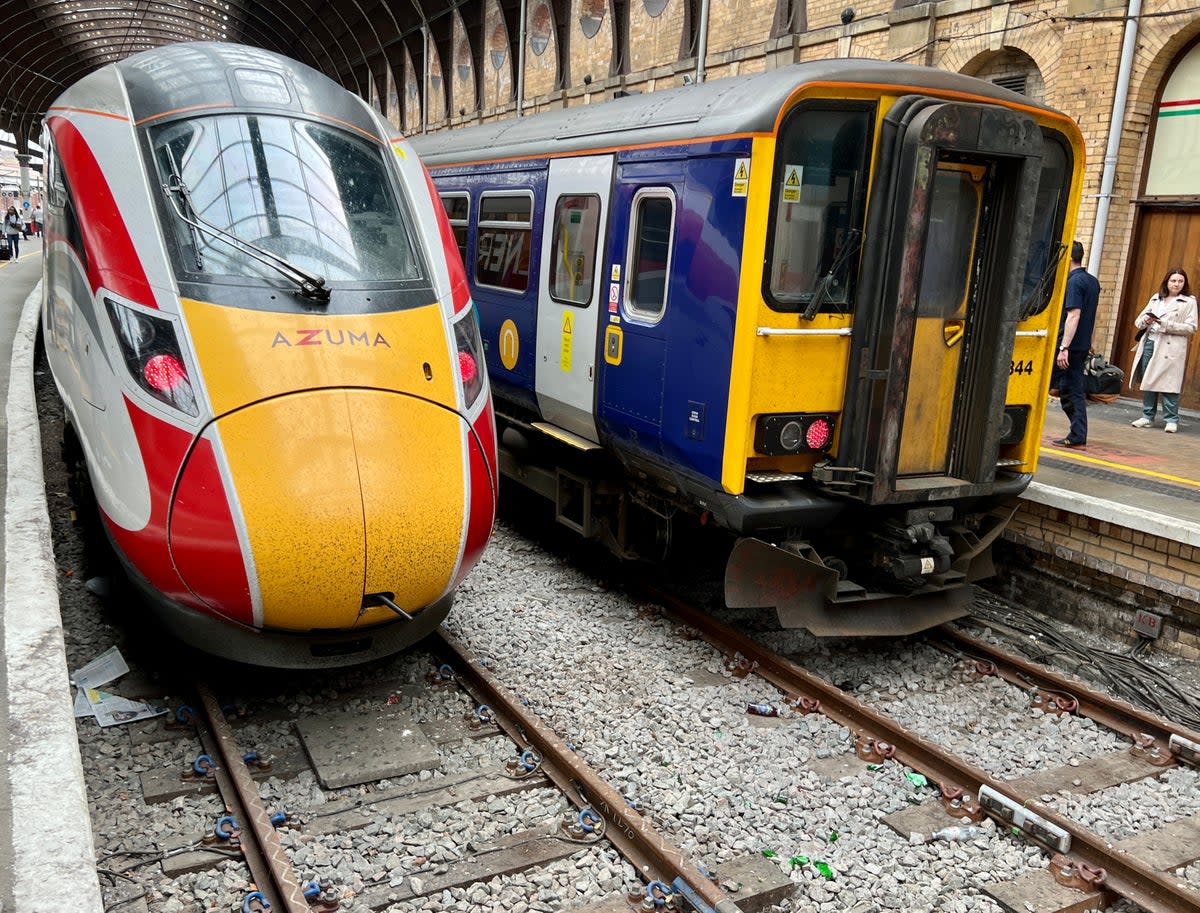Why are there more rail strikes and which routes are affected?

The train drivers’ union, Aslef, has given notice to 12 train operators that its members will walk out on Saturday 1 and Wednesday 5 October.
The first date is the day before the London Marathon, when many runners would plan to travel by train to the capital. The Conservative Party conference also opens in Birmingham on 2 October and ends on the day of the second strike.
A stoppage had been planned for Thursday 15 September, but within hours of the news of the death of the Queen the union said it was “postponing its industrial action”.
The walk-outs are the latest in a series of stoppages by rail workers through the summer.
These are the key questions and answers.
Which train operators will be affected by the strike?
Six of the train operators are mainly intercity:
Avanti West Coast
CrossCountry
GWR
Hull Trains
LNER
TransPennine Express
The other six are mainly commuter operators:
Chiltern
Greater Anglia
London Overground
Northern
Southeastern
West Midlands Trains
Why are the strikes happening?
Aslef says: “Most train drivers haven’t had a pay increase since 2019. When inflation goes up and pay doesn’t, that’s a real-terms pay cut.
“Senior managers in our industry take home huge salaries; rail operators have paid dividends to their shareholders right through the pandemic, and the rolling stock companies (who own the trains and lease them back out) have made billions.
“The claim that there’s no money left to pay rail workers properly is just not true.”
Strike ballots among train drivers have typically ended 90:10 in favour of strikes, on high turn-outs.
Will any trains run on the strike days?
Yes. Passengers can expect to be told to attempt to travel only if essential, but as with previous strike days many trains will run.
The train operators fall into three groups:
Unaffected, because drivers will be working normally. This includes East Midlands Railway, Grand Central, Lumo, Merseyrail, ScotRail and Transport for Wales, as well as the Great Northern/Southern/Thameslink combo operating north and south of London.
Running a partial service: past experience suggests most of the strike-hit companies will be in this category, including Avanti West Coast, CrossCountry, GWR, Hull Trains, LNER, Northern and TransPennine Express.
No trains: Southeastern and London Overground have previously been in this category.
Where partial services are operated, they may be skeletal. For example, on previous strike days the main GWR service has been an hourly train each way between London Paddington and Bristol.
On the East Coast main line from Edinburgh, northeast England and Yorkshire to London, Lumo and Grand Central should be running normal services – though trains are likely to be busy. The same applies for ScotRail and Transport for Wales links, especially when they duplicate routes on which intercity trains have been cancelled, such as Aberdeen to Edinburgh and Swansea via Cardiff to Newport.
Can I book tickets for strike dates?
On train operators that are unaffected, yes – and some advance deals should be on offer. On affected rail firms that are running some services, you can buy anytime or off-peak tickets and climb on board – if there is physically room.
What if I have an advance ticket booked already for one of the strike days?
You should be able to get a refund or a voucher. If your train is cancelled but others are running, you can travel on the nearest alternative departure before or after the journey.
Will Eurostar trains from London to Paris, Brussels and Amsterdam be affected?
No. At this stage Network Rail signallers are expected to work normally, which means a full service should operate.
Will other strikes be called?
Almost certainly. As well as Aslef strikes on 1 and 5 October, the RMT is expected to announce fresh strikes next week for October. At least 14 days’ notice must be given for any stoppage. With an announcement unlikely before 20 September at the earliest, action is unlikely before 4 October.
Can I book with much certainty?
Not very far ahead. As the journalist Daniel Puddicombe notes, the “Book with Confidence” scheme expires at the end of September. This offer, design to entice travellers back to the railway after Covid, allows people who book advance tickets online to cancel for a voucher up to 6pm the day before departure.
“Realistically people can now only really plan 14 days in advance for the foreseeable future,” he says. “Joy.”
How long will these disputes drag on?
The unions make it clear they are prepared for a long haul.
But in a letter to the new transport secretary, Anne-Marie Trevelyan, RMT general secretary Mick Lynch said: ”There is clearly now the opportunity for a new approach from the government to facilitate discussions between the RMT and the employers where the train companies and Network Rail are given more flexibility to secure a deal that is in the interests of workers, passengers and the country as a whole.“
Union bosses say the Department for Transport (DfT) is pulling strings and preventing the operators from making pay offers that would approach the current rate of inflation – almost 10 per cent.
The government maintains that any pay settlement must include productivity agreements for “modernisation” of the rail network. Since the lockdowns of the Covid-19 pandemic, revenue from tickets has slumped with far fewer commuters buying season tickets.
Ms Trevelyan has invited the general secretaries of the three main rail unions to talks and met the Aslef general secretary, Mick Whelan, on Wednesday 14 September.

 Yahoo News
Yahoo News 
